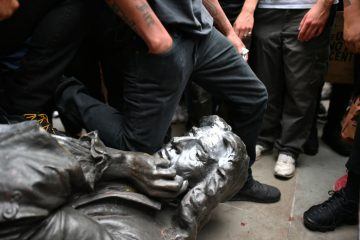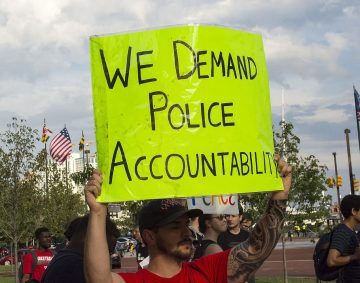by Chris Horner

There are times when customary evils become outlandish and intolerable. Then there is a call for irreversible ethical change, a transformation of more than the way we judge this or that, times in which which old laws are struck down and new ones framed. I want to suggest that a change in the structure of feeling occurs, when the ethical substance of our lives is transformed. This can happen at a glacial pace, or – as now -very quickly indeed. In Lenin’s famous remark ‘There are decades where nothing happens; and there are weeks where decades happen’.
In such a time as this, people are mobilised in new ways; symbols like statues and flags that might once have been barely registered take on the significance of exemplars. And an act of cruelty that might once have been part of the drab monotony of unchangeable oppression takes on a paradigmatic, mobilising force. Then everything seems to be moving. Of course, one can see change as merely exchanging one kind of ethical outlook for another, with no way of choosing which is best, the view of the moral relativist. ’They thought X was OK back then, and we don’t. Whose to say who is right?’ This is quite mistaken. For a start there were people ‘back then’ who condemned slavery, the subordination of women, empire and much more. The society of the past, as now, did not speak with one voice: it had dissidents, reformers and heretics. Nor is the past hermetically sealed off from the present: we are what they became.
Change occurs because the old is no longer viable. The events that punctuate such transformations get the most attention, of course – the abolition of slavery or the right of women to vote. But something more profound happens, too, and it is a kind of shift in the ethical ground, the ways of feeling and thinking. We cannot now, for example, regard gender roles as most Victorians did. Nor would most of us want to. Those who do want the past back, who want to confine women to the kitchen and the nursery, or who think that their ‘race’ confers on them a superior status, come to look weird and often detestable. The old structures of power and exclusion that persist into the present eventually appear as something to be overthrown. Such an overthrow is rarely easy, and to understand why it occurs we would need to consider economic and social change, the contradictions that build up until they reach a critical stage. The result is a change in the way people feel, felt like a change in atmospheric pressure. The pressure is changing now.

People have known about the history of slavery and empire for a long time. Enough has been taught, shown and said that its history should not be a surprise to anyone. Yet for some, it apparently still is. Injustice in our society is hardly news: the way in which black people have been beaten, imprisoned, underpaid, and even killed in the streets or cells by police isn’t new either. And statues to Confederate ‘worthies’ and to eminent slavers have been standing among us for decades. There have been many attempts in the past to find justice for victims, to prevent further deaths and to pull down symbols of oppression. But this time it feels different. There is a groundswell of change in the discourse of race, in protest and what very many – perhaps a majority – will now tolerate. All this has provoked sharp debate and disagreement. But is this just moral disagreement? I want to suggest that we may be experiencing a shift in the way people feel, think and act that goes deeper than that, possibly a profound shift in ethicality, in what the German philosopher Hegel called sittlichkeit. Let me explain.
We can think of individuals as free agents striving to get on, with laws which safeguard lives and possessions, framed according to the principle: do as you like as long as you do not harm others. This is what Hegel calls abstract right. The state is the external agency, responsible for enforcing those rules. However, there is something one-sided about this picture of a person as a bearer of abstract right, making contracts, alliances, competing or co-operating etc. Individuals are also moral beings: conscientious subjects with values, making judgments about what is right. It follows from this that there will be different ideas of what is good. How can there be agreement if everyone’s conscience is authoritative?

Hegel argues that Sittlichkeit (‘ethical substance’) is the context in which it is possible to attain real freedom. The idea directs our attention to the real structure of human interaction, based on laws, customs, obligations and common politeness, the life lived by people socialised into a community. This is the world of shared ideals, notions of decency and fairness. It is the normative soil in which abstract right and morality grow: they depend on it, and any conception of a life that emphasises abstract right or moral intuition alone is seriously lacking. And these norms imply duties, which include, but are not limited by, explicit laws and personal conceptions of what is right.

Duties arise out of one’s concrete social position: one’s relations with others as a mother, employee, voter, teacher, student, taxpayer etc. To identify with them, is to freely will them. Complex modern societies envelop their citizens in a dense matrix of such duties, mostly unwritten. They are the tacit rules by which people live – and which imply that the individual can read between the lines of what is said, grasping spirit as well as letter and understanding the implicit and the metaphorical. These are duties willed in order to live a life. According to Hegel, this acceptance of duty is also freedom. But how?
On the face of it, sittlichkeit as a dense mass of duties and norms would seem to be the opposite of freedom. Hegel, however, does not agree. Duties do not bind and restrict: ‘in duty the individual finds his liberation’ (Philosophy of Right, S. 149). For Hegel, the duties of the ethical world provide us with a way out of the merely natural impulses of the individual and the hopelessness of the moral self that can never see the goodness it wants reflected in the world around it. This can sound ominous. Is Hegel advocating a kind of authoritarian state? The answer is no: modern sittlichkeit (in contrast to that of earlier epochs) must include autonomy, personal rights and must be able to be reflectively endorsed by an individual. One must find that one’s conscience is not at war with one’s duties. That this could be so should be no surprise, since the individual has been formed, socialised, by that very sittlichkeit within which she lives. Freedom is not something one just has, but rather achieves through development of the self growing on the soil of sittlichkeit. One cannot be free if one just follows natural impulses, as it will lead to a war of all against all, a clash of egos. Nor can one be free if one is alienated morally from the shared, really existing structures and institutions of society, for in such a case one will either be in a futile war with it, or one will retreat into the lonely satisfactions of being a ‘beautiful soul’, living in and on such a society while refining one’s impotent contempt for its sinfulness. For Hegel, it is only in and through the right kind of really existing social life that one can achieve freedom.
For Hegel, civil society is the social context in which our private interests are promoted (still grounded in the ethical substance, remember) and political community is where we focus on the good of the community itself, the common good, or public interest. It is this that the self-conscious, self-determined citizen will promote for its own sake; it is here that she will be a truly communal and universal being. But this can only occur if the self has been nurtured into a genuine web of norms by which notions of decency, fairness, and happiness can be lived, and not merely dreamed about.

But sittlichkeit is also a problem. Rather than a benign web of duties and norms, forming the happy citizen in a matrix of habit and attitude, it can have other meanings. The ethical substrate has to be responsive to the needs and wishes of the self-aware modern citizen: something she can reflectively endorse, something which finds a place in it for her autonomy, and which guarantees her rights. But what if it doesn’t do this? It might well be one in which individuals and groups do not find their place, because they experience the ethical substance as alien and oppressive: Law, which simply perpetuates itself. Think of the south in the days of ‘Jim Crow’: a racist sittlichkeit, based on ideas of white superiority. The ‘ethicality’ of society becomes a kind of trap or cage, the thing that needs to be overcome to achieve true emancipation.
But perhaps not. Rather than viewing this state of affairs as a ‘toxic sittlichkeit,’ it might be better be conceived as the antithesis of true ethicality. There can be nothing truly ethical about a society that cramps and crushes the human subject. We could see the sittlichkeit of moderns as an imperfectly realised thing, as yet unachieved in our unjust societies. Hegel wrote that ‘the rational is actual, the actual is rational’. What he did not mean by this was that whatever we’ve got must be as it is, and is therefore right. He was at pains to distinguish between the rational essence of a thing and its possibly inadequate expression in the contingencies of ordinary life. So a modern society that does not promote human freedom is one in which its rational essence has not been ‘actualised’. What happens merely to exist in such a flawed society (a society of alienation and exploitation) is out of kilter with what a fully rational state would truly be.

It’s important not to think of sittlichkeit as an inert thing, timeless and seamless. It is deeply historical, and subject to change; it is also always incomplete and open to dispute. Historical memory is embedded in that web or norms and meanings. But culture is something that is constantly made and remade. Laws, norms and ideals are the deposit of the actions of previous generations, open to being revised by the present, for the future. If the sittlichkeit is in some sense invaded by something else, like a virus or poison invading an organism, it is also itself the place from which everything hopeful comes, from the utopian dimension in art and religion to the simple cry of outrage at injustice. It is where the justification for the outrage at injustice comes from, and where we find the basis for a response to the complacent individual who can’t see what is wrong with what happened to George Floyd.
The anger that we feel is that of the person who senses that the ethical substance has been damaged or subverted. In isolated cases such subversions can be seen for what they are, isolated breaches in the fabric of our common lives, which social pressure and legislation can fix. The problem we face, I suggest, is when the breaches are so numerous and repeated that the sittlichkeit itself is brought into question. What one does in an unjust society, is a question for us, now. We can choose to wait for change in the structures of power and domination that would represent some kind of revolution in the long run. But in the long run, as the saying goes, we are all dead. What should one do now?
The key is to build on people’s justified sense of outrage. It’s a question of working for change in the ethical substance of our society by drawing on the the norms of justice and fairness that already exist there. This is desirable and practicable, and the basis for it already exists in the anger at the unfairness we see all around us. What is seen as acceptable can change. Struggles against sexism, racism and abuse of all kinds have made progress, although that progress can never be taken for granted. Law, here, will not be enough unless the sense of what is intolerable is made manifest, if necessary through direct action by groups like Black Lives Matter. It doesn’t happen overnight, but it can be done. Think of the changes we’ve seen on Green issues, child abuse, racial and sexual discrimination, homophobia, hate speech, and so on. The fact that that very large numbers of people already feel a sense of outrage at the existence of food-banks in a rich country, obscenely large bonuses paid to bankers, people being denied housing, zero contracts, corporate tax dodging and escalating inequality is a sign that that the ethical sense can be a source of radical change – if we mobilise and fight for it. Ensuring that such changes move in an enlightened way, promoting freedom rather than oppressing it, is what progressive political and social action is all about.
